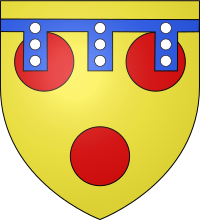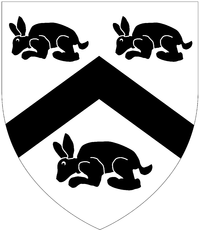Newnham Park




Newnham Park (before circa 1718[1] Loughtor) is an historic estate in the civil parish of Sparkwell, Devon, UK. It was known as Loughtor until about 1700 when the ancient Strode family, long seated at Newnham, about 1 mile south-east of the manor house of Loughtor, abandoned Newnham and moved their residence to Loughtor (which they had inherited by a marriage in the 16th century) where they built a new mansion house which they renamed "Newnham Park". In 2014 the mansion house with an estate of about 1,550 acres[2] is still owned by a descendant (via various female lines) of the Courtenay and Strode families which held the estate from the 15th century,[3] and which were well established in the county of Devon long before that time. In 2014 part of the estate is operated as a commercial clay-pigeon shooting ground.[4]
Descent
Sir William Pole (d.1635) relates the early holders of Loughtorre as follows:[5]
Le Abbé
The first recorded holders of Loughtor was the family of Le Abbé (alias Le Abbe,[6] le Abby[7])
- William Le Abbé of Radford (alias Redford), in the parish of Plymstock, recorded as having held Loughtor in 1242[8]
- Robert Le Abbé
- Henry Le Abbé, of Alsemston[9]
- Walter Le Abbé, whose descendants adopted the surname de Radford[10]
de Radford
The de Radford family (formerly known as Le Abbé) continued to hold Loughtor, apparently until the 15th century, when the next known holder was William Courtenay, a younger son of Sir Philip Courtenay (d.1488) of Molland in North Devon.
Courtenay



The next recorded holder following the de Radford tenure was a younger son of the Courtenay family of Molland in North Devon. It is not clear how this family acquired Loughtor, but the feudal barony of Plympton had certainly been held by Hugh Courtenay, 2nd Earl of Devon (1303-1377),[12] seated at Tiverton Castle and Okehampton Castle, from whom the Courtenay family of Molland was descended.[13]
- William Courtenay, a younger son of Sir Philip Courtenay (d.1488) of Molland in North Devon.[14] His monument survives in St Mary's Church, Plympton, against the south wall of the south chancel aisle, consisting of a stone effigy of a recumbent knight on a chest tomb within a canopied niche.
- Sir Philip Courtenay (son), who according to Vivian (p. 251) died without progeny, but according to Pole (p. 330) had a daughter Elizabeth.
- Elizabeth Courtenay. According to Pole (p. 330) she was a daughter of Sir Philip Courtenay of Loughtor, William's son. However, according to Vivian (p. 251) she was the daughter of Philip Courtenay, William's elder brother, by his wife Jane Fowell (d.1523),[15] daughter of Richard Fowell of Fowelscombe[16] in the parish of Ugborough, which former mansion house is today a ruin.[17] Jane Fowell survived her husband and remarried (as his first wife) to Humphrey Prideaux (1487-1550) of Thuborough[18] in the parish of Sutcombe.[19] Elizabeth Courtenay, heiress of Loughtor, married William Strode (1512-1579) of Newnham.[20]
Strode

- William III Strode (1512-1579) of Newnham, who married Elizabeth Courtenay, heiress of Loughtor.[21] He had by Elizabeth several sons and daughters, the eldest son and heir having been Richard V Strode (d.1581). The 6th son however was Rev. Sampson Strode (born 1552), rector of Dittisham, whose great-great-grandson was Richard Strode (1750-1790) of Boterford, who inherited the ancient estates of the senior Strodes on the failure of the male line of Strode of Newnham, following the death in 1767 of William Strode of Newnham.[22] The 4th son was Philip Strode (d.1605) who married Wilmot Houghton, daughter of William Houghton of Houghton Towers, Lancaster, and was the father of William Strode (1602-1644), Doctor of Divinity and Public Orator of Oxford University, one of the Worthies of Devon of John Prince (d.1723),[23] who called him "this reverend divine, this rare poet, this charming orator".
For the descent of Loughtor in the Strode family until 1718 see Newnham (Old).
Until 1718 it is not clear what use, if any, was made by the Strode family of the old manor house of the Courtenays at Loughtor, as they appear to have continued to reside chiefly at "Old Newnham". The first of the Strodes to live at Loughtor was:
- Sidney II Strode (1684-1721). He was the nephew and heir of William Strode (d.1718) of Newnham who died without progeny. Sidney II was the son of Sidney I Strode (1655-1712), who had died before his elder brother and thus did not himself inherit. Sidney II thus inherited the Strode estates aged 34, only 3 years before his own death in 1721, but during that short time abandoned Old Newnham and moved his residence to the manor of Loughtor, 1/3 mile to the north-east, where he rebuilt the manor house and called it "Newnham Park"[24] He married Ann Trevanion, daughter of Sir Nicholas Trevanion, by whom he had a son William Strode (1718-1767)
- William Strode (1718-1767) (son), who died without progeny, when the heir to Newnham Park and the other estates became his distant cousin Richard Strode (1750-1790) of Boterford.[25] descended from William Strode (d.1579) of Newnham by his wife Elizabeth Courtenay, heiress of Loughtor.[26]
- Richard Strode (1750-1790) of Boterford, North Huish, Devon,[27] (cousin), descended from William Strode (d.1579) of Newnham by his wife Elizabeth Courtenay, heiress of Loughtor.[28] He resided at Newnham Park and in 1788 sold his family's former seat of Boterford and another estate at Whitecombe to Thomas Palk.[29] He married Admonition Lear, daughter of Thomas Lear of Sandwell in the parish of Harberton. A prominent branch of this family was founded by Sir Peter Lear, 1st Baronet (died c. 1684) of Lindridge.
- William Strode (d.1802) (eldest son and heir), died unmarried. One of his younger brothers was Capt. Thomas Lear Strode (1787-1817), 43rd Regiment of Foot, whose mural monument survives in St Mary's Church, Plympton.
- Rev. Richard Strode (1779-1819) (brother), who married Harriet Rogers, daughter of Sir Frederick Rogers, 5th Baronet (1746–1797), MP, of Wisdome, Devon. All four of his daughters died young, and his mural monument survives in St Mary's Church, Plympton.
- George Sidney Strode (1780-1857) (brother), Sheriff of Devon in 1825. He married Dorothea Bird Symons (d.1862), daughter of William Symons of Chaddle Wood, Plympton.
- George Sidney Strode (1829-1874) (son), OBE, Provincial Grandmaster of the Freemasons. He married but died without progeny.
- Dorothea Georgina Admonition Strode (1823-1896) (eldest sister)
Lowe (Strode)
- George Sydney Strode Lowe (nephew). He was the son of Dorothea's younger sister Florence Strode by her husband Admiral Arthur Lowe (1814-1882) of Burford, Shropshire. In 1897 in accordance with the bequest he changed his name by royal licence to Strode and adopted the arms of Strode. He married Anna Fielding Boyd, daughter of Thomson Boyd of Edinburgh, by whom he left two daughters and co-heiresses:[30]
- Anna Strode, who in 1912 married Henry Grigg (d.1935) of Cann House, Tamerton Foliot[31]
- Eileen Strode (1893-1950), who in 1932 married Col. Edward Valle-Pope (1898-1968), and left a daughter Judith Eileen Strode Valle-Pope (born 1934).[32]
Cobbold
In 1955 Judith Eileen Strode Valle-Pope (born 1934) married Michael Maurice Cobbold (1931-2002), descended from an old Suffolk brewing dynasty,[33] a professional soldier, engineer, publisher, preserver of ancient buildings and sheep-farmer. In 1969 Judith Cobbold (née Valle-Pope) inherited Newnham Park[34] with its 1,550 acre estate, and with her husband developed the estate as a corporate entertainment business including shooting, archery, carriage-driving and off-road vehicles and moto-cross.[35] Her son David Michael Strode Cobbold (born 1961) is the owner of Newnham Park in 2014.
Sources
- Vivian, Lt.Col. J.L., (Ed.) The Visitations of the County of Devon: Comprising the Heralds' Visitations of 1531, 1564 & 1620, Exeter, 1895, pp. 718–20, pedigree of Strode of Newnham
- Pole, Sir William (d.1635), Collections Towards a Description of the County of Devon, Sir John-William de la Pole (ed.), London, 1791, pp. 329–10, Newenham & Loughtorre
- Risdon, Tristram (d.1640), Survey of Devon, 1811 edition, London, 1811, with 1810 Additions, pp. 197–8, 395, Newnham & Loughter
- Pevsner, Nikolaus & Cherry, Bridget, The Buildings of England: Devon, London, 2004, pp. 582–4, Old Newnham & Newnham Park
- Burke's Genealogical and Heraldic History of the Landed Gentry, 15th Edition, ed. Pirie-Gordon, H., London, 1937, pp. 2172–3, Strode of Newnham Park
- Gray, Todd & Rowe, Margery (Eds.), Travels in Georgian Devon: The Illustrated Journals of The Reverend John Swete, 1789–1800, 4 vols., Tiverton, 1999, vil 4, pp. 17–20
References
- ^ Following death in 1718 of William Strode his heir was his nephew Sidney II Strode (1684-1721) who moved his residence from Old Newnham to Loughtor, see below
- ^ "Home". newnham.co.uk.
- ^ See descent below, David Michael Strode Cobbold is the owner of Newnham Park in 2014
- ^ "Home". newnham.co.uk.
- ^ Pole, Sir William (d.1635), Collections Towards a Description of the County of Devon, Sir John-William de la Pole (ed.), London, 1791, pp.329–30
- ^ Pole, p.329
- ^ Risdon, p.197
- ^ Pole, p.329Regnal year 27 Henry III; Risdon, p.199
- ^ Risdon, p.199
- ^ Risdon, p.199
- ^ Pevsner, p.685
- ^ Sanders, I.J. English Baronies: A Study of their Origin and Descent 1086-1327, Oxford, 1960, p.138, which follows the descent of Plympton to his father Hugh Courtenay, 1st Earl of Devon (d.1340). Pole, p.9, carries on the descent of the Barony of Plympton in the Earls of Devon
- ^ Vivian, pp.244, 246, 251
- ^ Risdon, p.197, erroneously gives the date of the Courtenay tenure of Loughtor as during the reign of King Edward II (1307-1327), which is far too early as the first Courtenay of Molland was Sir Philip Courtenay (d.1488) (See Vivian, p.246)
- ^ Vivian, p.618, pedigree of Prideaux
- ^ Vivian, p.251, pedigree of Courtenay, p.369, pedigree of Fowell of Fowelscombe
- ^ Lauder, Rosemary, Vanished Houses of South Devon: Fowelscombe
- ^ Vivian, p.618, pedigree of Prideaux
- ^ Pevsner, p.771; Risdon, pp.248-9
- ^ Vivian, p.718
- ^ Vivian, p.718
- ^ Vivian, p.720
- ^ Prince, John, (1643–1723) The Worthies of Devon, 1810 edition, pp.730-735, biography of Strode, William, Doctor of Divinity
- ^ Risdon, p.395 (1810 Additions): "The present residence of the family was erected, about a century ago, by Sidney Strode Esq, and is now under the name of Newnham Park"
- ^ Vivian, p.720; Risdon, p.385-6
- ^ Vivian, pp.718-20
- ^ Vivian, p.720; Risdon, p.385-6
- ^ Vivian, pp.718-20
- ^ Risdon, pp.385-6
- ^ Burke's Landed Gentry, pp.2172-3
- ^ Burke's Landed Gentry, pp.2172-3
- ^ Burke's Landed Gentry, pp.2172-3
- ^ Cobbold Family History Trust, Patrons: Lord Cobbold DL; Ivry, Lady Freyberg; Nicholas Cobbold OBE [1]
- ^ "Biographies | Michael Maurice COBBOLD (#537) - the Cobbold Family History Trust".
- ^ "Biographies | Michael Maurice COBBOLD (#537) - the Cobbold Family History Trust".
